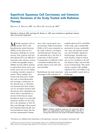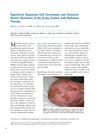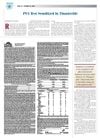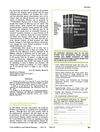 May 2022 in “Dermatologic therapy”
May 2022 in “Dermatologic therapy” Combining PRP with follicular transplantation improves vitiligo treatment better than follicular transplantation alone.
 May 2006 in “Dermatologic Surgery”
May 2006 in “Dermatologic Surgery” Radiation therapy successfully treated an elderly man's skin cancer and pre-cancerous scalp lesions.
 5 citations,
May 2006 in “Dermatologic Surgery”
5 citations,
May 2006 in “Dermatologic Surgery” Radiation therapy successfully treated an elderly man's skin cancer and pre-cancerous scalp lesions.
 April 2023 in “Journal of Investigative Dermatology”
April 2023 in “Journal of Investigative Dermatology” An elderly woman's upper lip lump, thought to be a mucocele, was actually a rare type of lymphoma usually found on legs, treated successfully with chemotherapy and radiation.
 53 citations,
April 2018 in “Journal of The American Academy of Dermatology”
53 citations,
April 2018 in “Journal of The American Academy of Dermatology” Cancer treatments often cause hair disorders, significantly affecting patients' quality of life, and better management methods are needed.
 7 citations,
May 2016 in “SpringerPlus”
7 citations,
May 2016 in “SpringerPlus” Some breast cancer patients on hormone therapy experience hair loss, and treatments like certain topical inhibitors and supplements may help without harming their cancer prognosis.
 88 citations,
June 2016 in “Human Reproduction Update”
88 citations,
June 2016 in “Human Reproduction Update” New hormonal contraceptives are safer, have fewer side effects, and offer health benefits for women.
 228 citations,
February 2003 in “Urology”
228 citations,
February 2003 in “Urology” Androgen deprivation therapy for prostate cancer can cause sexual, physical, and psychological side effects, and doctors should manage these carefully.
 9 citations,
September 2010 in “Dermatologic Therapy”
9 citations,
September 2010 in “Dermatologic Therapy” Finasteride for hair loss is safe and does not increase the risk of high-grade prostate cancer.
 1 citations,
October 2006 in “Oncology times”
1 citations,
October 2006 in “Oncology times” Finasteride improves prostate cancer detection in PSA test.
 May 2002 in “Australasian Journal of Dermatology”
May 2002 in “Australasian Journal of Dermatology” Finasteride is effective for male hair loss, teledermatology is accurate and accepted, and cyclosporin helps treat toxic epidermal necrolysis.
 21 citations,
June 1990 in “British Journal of Dermatology”
21 citations,
June 1990 in “British Journal of Dermatology” Systemic retinoids are effective for psoriasis but have side effects; benefits may outweigh risks, especially when reducing cancer risks from other treatments.
 27 citations,
January 1989 in “The Journal of dermatologic surgery and oncology”
27 citations,
January 1989 in “The Journal of dermatologic surgery and oncology” Using topical minoxidil before and after hair transplant surgery can reduce shedding and improve hair regrowth.
 108 citations,
November 1980 in “British Journal of Dermatology”
108 citations,
November 1980 in “British Journal of Dermatology” Oral retinoids are effective for various skin conditions but have side effects and should not be used during pregnancy.
 279 citations,
June 1990 in “Journal of Clinical Oncology”
279 citations,
June 1990 in “Journal of Clinical Oncology” Adding chemotherapy to tamoxifen improves survival for older breast cancer patients with positive nodes.
 7 citations,
September 2023 in “Cancer Treatment Reviews”
7 citations,
September 2023 in “Cancer Treatment Reviews” Managing side effects of endocrine therapy is crucial to improve adherence and survival in breast cancer patients.
 4 citations,
June 2002 in “Clinical and experimental dermatology”
4 citations,
June 2002 in “Clinical and experimental dermatology” Effective treatment for hidradenitis suppurativa varies, with antibiotics commonly used and surgery as an option, but no single method is universally successful.
1 citations,
April 2023 in “Heliyon” Disitamab vedotin and gemcitabine effectively treated bladder cancer without major side effects.
 17 citations,
May 2011 in “Gene Therapy”
17 citations,
May 2011 in “Gene Therapy” Using polyethylenimine-DNA to deliver the hTERT gene can stimulate hair growth and may be useful in treating hair loss, but there could be potential cancer risks.
 13 citations,
August 1980 in “Cancer”
13 citations,
August 1980 in “Cancer” Multimodal primary treatment improves survival in premenopausal breast cancer patients and is also beneficial for postmenopausal women.
 17 citations,
December 2020 in “Journal of Genetic Counseling”
17 citations,
December 2020 in “Journal of Genetic Counseling” Genetic counselors should be culturally skilled and aware of transgender patients' unique health risks and needs.
 6 citations,
November 2021 in “Oncology Research and Treatment”
6 citations,
November 2021 in “Oncology Research and Treatment” Low Vitamin D receptor levels in breast cancer are linked to worse outcomes and more bone metastases, and could be a marker for prognosis.
March 2022 in “Oncology Times” Tebentafusp-tebn improves survival rates in uveal melanoma patients but has common side effects like rash and fatigue.
 33 citations,
December 2012 in “NMR in Biomedicine”
33 citations,
December 2012 in “NMR in Biomedicine” Microencapsulation helps protect and track therapeutic cells, showing promise for treating various diseases, but more work is needed to improve the technology.
 67 citations,
April 2018 in “JAMA Dermatology”
67 citations,
April 2018 in “JAMA Dermatology” Hair loss from hormone therapy in breast cancer patients can be improved with minoxidil treatment.
 64 citations,
August 2019 in “Circulation”
64 citations,
August 2019 in “Circulation” ADT, especially enzalutamide, may increase the risk of heart rhythm problems and sudden death in men.
 August 1978 in “Dicp-The annals of pharmacotherapy”
August 1978 in “Dicp-The annals of pharmacotherapy” Mannitol diuresis allows higher doses of cis-platinum for testicular cancer treatment without increasing kidney damage.
 8 citations,
June 2019 in “Orphanet journal of rare diseases”
8 citations,
June 2019 in “Orphanet journal of rare diseases” Corticosteroids are the most effective treatment for Satoyoshi syndrome.
 3 citations,
June 2022 in “Dermatology and therapy”
3 citations,
June 2022 in “Dermatology and therapy” A new botanical treatment improved hair growth and symptoms in lichen planopilaris patients.
12 citations,
December 2010 in “Journal of thoracic oncology” New treatments for non-small cell lung cancer are being tested, with some already in use, focusing on immune response and targeting cancer cells, but side effects vary.


























